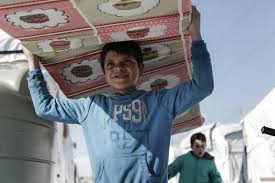
Government officials won’t discuss the focus of the round-the-clock meetings that have been taking place in the last week, but both countries are likely to be in their sights for direct support.
The situation is especially dire in Lebanon, a country with strong ties to Canada thanks to a large diaspora population.
Lebanon currently hosts 1.4 million Syrians — nearly one refugee for every four of its own citizens, overwhelming every scrap of its resources. The UN reports that 40 per cent of Syrian refugees in the country are under the age of 11 and dire economic circumstances are sending many into the streets to beg for food or be forced into early marriages.
Lebanon has also been a refuge for Christians fleeing Islamic militants in Iraq and Syria because of the country’s own large Christian population. While the Lebanese government has cracked down on admitting new refugees in recent months, it carved out exceptions for Assyrians in particular after that group was subject to direct attack from ISIL.
The Canadian government is targeting two specific groups for resettlement: vulnerable children and religious minorities, which Prime Minister Stephen Harper indicated this week still remain a priority.
“We are going to take some measures as well to expedite the process, to make sure this process moves forward more quickly and more effectively than it has today — but at the same time in a way that protects security, and also makes sure we are prioritizing the right people, the people who are the most vulnerable, and genuine refugees,” Harper said.
“We will let people know, as soon as we can responsibly do that, what our plans are.”
On the security piece, Harper has a key ally in the region who could be instrumental in helping find solutions to expedite that part of the process. The current Canadian ambassador to Jordan is Bruno Saccomanni, the RCMP officer who led the prime minister’s personal protective detail. Prior to that, Saccomanni worked in the RCMP’s immigration and passport division, which handles overseas investigations in both those areas.
The government has given nearly $300 million in direct aid to Jordan so far to help them cope with the fallout from the refugee crisis. The kingdom is hosting about 630,000 refugees, most housed in massive camps. Harper visited one such camp during his tour of the Middle East last year and afterwards announced some of that aid.
Increasing bilateral support and aid should be a key component of any new plan, said Glenn Davidson, Canada’s last ambassador to Syria before the embassy there was closed in 2012.
Even if the international community were to take 200,000 refugees, that still leaves 3.8 million who need help, he pointed out.
“Big families, young families, need education, job skills, some prospect for hope and future employment so the circumstances of the camps and the despair that they can fall into doesn’t radicalize them,” he said.
About a fifth of the $503.5 million in humanitarian aid Canada has pledged for the Syrian crisis flows directly to Lebanon via international partner agencies, though the country has yet to be the recipient of direct bilateral support.
That’s in part because the Lebanese government is currently in chaos, with no president and a paralyzed parliament. But it also reflects the difficult diplomatic dance Canada does there given the role of Hezbollah in the Lebanese government.
The militant arm of that party was involved in a war with Israel in 2006, which spurred the Canadian government to airlift 14,000 Canadians from Lebanon in a matter of weeks.
That number of Syrian refugees could easily be brought to Canada in a matter of months, 12 refugee advocacy groups said Friday in releasing their suggestions for what the Canadian government could do next.
Their recommendations also include introducing flexible immigration measures for Syrians with family in Canada, restoring access to full health care coverage for refugees to ease the burden on private sponsors and eliminating the requirement that people must be declared a refugee by the UNHCR before they can be resettled.
And none of that will be possible without an additional increase in human, financial and logistical resources, said Loly Rico, President of the Canadian Council for Refugees.
“Canada has the experience and the capacity to make a substantial response to the Syrian refugee crisis and Canadians have shown they have the will.”
The Spec

Leave a Reply
You must be logged in to post a comment.